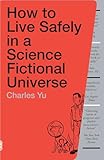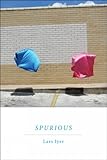The commute to my day job takes an hour. Books are indispensable, because while I don’t necessarily believe that hell is other people (I’ve given this some thought, and am actually reasonably certain at this point that hell is Delta Airlines), if I had to be fully present on the subway for two hours a day I’d probably start snarling at random strangers.
Forgetting to bring a book with me constitutes an emergency. I’ve turned back on the street on harried mornings and walked back up four flights of stairs just to find something, anything to read. If I’m almost finished a book, I’ll take an extra just in case. All my memories of reading this year involve harsh overhead lighting, bright stations, glancing up in time to see that strange underground river that runs along the G line, and noise-blocking headphones. (There’s often nothing attached to these headphones. I just need a plausible reason to ignore anyone who bothers me while I’m trying to read.)
So, then, a few of the best books I read this year. This isn’t exhaustive, and to a reader of The Millions or other literary blogs, this list will likely have an air of déjà vu. The books I particularly loved this year mostly fell into one of two categories: either I already wrote them up on The Millions, or I didn’t write them up here, but only because they were already so popular that it kind of seemed like everyone was writing them up everywhere else, and what’s the point of covering a book that everyone else has already covered, when so many wonderful books are published each and every week with insufficient publicity budgets?

 1. How To Keep Your Volkswagen Alive by Christopher Boucher
1. How To Keep Your Volkswagen Alive by Christopher Boucher
Christopher Boucher’s debut novel concerns a young man whose girlfriend gives birth to a 1971 Volkswagen Beetle. I found it to be deeply moving and hilarious.
2. How To Live Safely in a Science Fictional Universe by Charles Yu
An intelligent novel about a time-machine technician. Upon reflection, there are surface similarities with the Boucher novel (sad young man seeks father in surrealist alternate universe), but this one’s less surreal and more pseudo-sciencey. I think of it as a beautifully conceived piece of literary science fiction. I very much like the idea of galaxies that are specifically zoned for space opera.

 3. After Midnight by Irmgard Keun
3. After Midnight by Irmgard Keun
Keun published this novel in 1937. The book follows a 19-year-old German girl, Sanna, through a catastrophic evening in late-1930s Frankfurt. It’s harrowing and beautifully written.
4. Spurious by Lars Iyer
A poignant and often funny meditation on friendship, failure, the apocalypse, messianism, Kafka, and mold. Mostly it’s an extended conversation between a writer named Lars and his best friend, W., who feels compelled to express his love via insults. (“W. remembers when I was up and coming, he tells me. He remembers the questions I used to ask, and how they would resound beneath the vaulted ceilings. — ‘You seemed so intelligent then,’ he says. I shrug. ‘But when any of us read your work…’, he says, without finishing the sentence.”)
5. Snowdrops by A.D. Miller
The book concerns a lonely British lawyer living and working in Moscow in the 1990s. There’s a body in the first chapter, but the real story here isn’t the crime; it’s the extent to which we’re willing to lie to ourselves, to ignore the obvious, in pursuit of happiness or companionship or love.
More from A Year in Reading 2011
Don’t miss: A Year in Reading 2010, 2009, 2008, 2007, 2006, 2005
The good stuff: The Millions’ Notable articles
The motherlode: The Millions’ Books and Reviews
Like what you see? Learn about 5 insanely easy ways to Support The Millions, The Millions on Twitter, Facebook, Tumblr.










